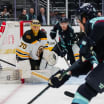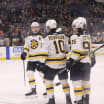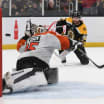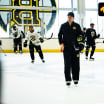BOSTON - Bobby Orr did not hesitate to answer the question. To him, there was little debate.
When asked which man was the greatest Bruin to ever lace up the skates, the legendary defenseman answered definitively. It was Milt Schmidt.
Schmidt passed away Jan. 4 at Newton-Wellesley Hospital. He was 98.
Milt Schmidt: The Ultimate Bruin
Legendary center passes away at 98
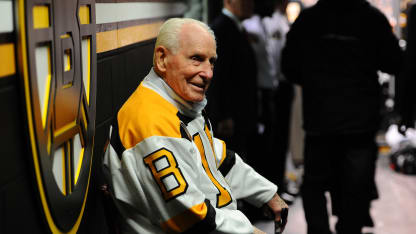
"I didn't see Milt play, but he had a heart this big," Orr said while motioning widely with his hands. "He's a great man and a great friend to all of us."
Orr was sitting beside Schmidt as he delivered the proclamation, while the two prepared to drop the ceremonial first puck at the Bruins' 2016-17 home opener at TD Garden, marking the 50th anniversary of Orr's first game and the 80th anniversary of Schmidt's first game.
"He's got to say that, because I'm sitting right beside him," Schmidt shot back with a laugh.
The respect shown by Orr - who many consider to be the greatest hockey player of all-time - makes apparent the renowned impact Schmidt had on the Boston Bruins organization.
Schmidt is the only man in Bruins history to have served the club as player, captain, coach, and general manager. The "Ultimate Bruin," as he is known to so many throughout the organization, was an integral part of four Stanley Cup Championships, capturing two as a player in 1939 and 1941 and two as a general manager in 1970 and 1972.
The Kitchener, Ontario, native, born March 5, 1918, played all 16 of his NHL seasons in Boston, from 1936-1955, registering 229 goals, 346 assists, and 575 points in 776 career games. He was a four-time NHL All-Star, won the Hart Trophy as the league's Most Valuable Player in 1951, captured the Art Ross Trophy as the NHL scoring champion in 1940, and was elected to the Hockey Hall of Fame in 1961.
"The first Stanley Cup team, 1938-39, was by far the best thing that ever happened to me, because as we all know, there are great players in the National Hockey League that were never on a Stanley Cup team," Schmidt once said.
"I was on four of them. Even better than the MVP in '51 and the All-Star Games and whatever. The Stanley Cup was the best ever."
Schmidt came to the club as an 18-year-old, playing his first game on Dec. 22, 1936. The hard-hitting center ranks 12th on Boston's all-time scoring list and is fourth in seasons played. Fellow Hall of Famer Gordie Howe once described Schmidt as "the toughest opponent I ever played against."
"From Day One, the Boston Bruins meant an awful lot to me," Schmidt said before an appearance in Montreal in 2007. "To be invited to the training camp of the Boston Bruins, I really can't emphasize how I felt the first time I got on the ice.
"When I was 17 at training camp, playing on the same ice surface as guys like Eddie Shore, Dit Clapper, Red Beattie…what a thrill it was."
His accomplishments would have been even greater had Schmidt not lost three years of his playing career while serving in the Royal Canadian Air Force during World War II.
Schmidt, who was the NHL's oldest living former player at the time of his death, centered the Bruins' famed "Kraut Line," considered one of the finest National Hockey League trios ever assembled, along with childhood buddies Woody Dumart on the left wing and Bobby Bauer on the right wing.
In 1939-40, the three players became the first triumvirate from the same team to finish 1-2-3 in the league's scoring race. Schmidt won the league's scoring title with 52 points that season, while Dumart and Bauer finished second and third with 43 points apiece.
"I played with two of the greatest guys in the world, both on and off ice," said Schmidt. "Without their help…I probably wouldn't have the things said about me."
All three players left for World War II together, playing their final game before reporting for duty on Feb. 10, 1942. They combined for 11 points in an 8-1 win over Montreal. At the conclusion of the game, they were honored by receiving their full season paychecks, bonuses, watches, and golf identification bracelets. As "Auld Lang Syne" played on the Boston Garden organ, Schmidt, Bauer, and Dumart were hoisted upon the shoulders of both the Canadiens and Bruins players and carried to the dressing room.
Schmidt retired in December 1954 and immediately stepped behind the Bruins bench, coaching his first game on Dec. 25, 1954, a 3-3 tie with Chicago. He remained coach through the 1960-61 season, twice reaching the Stanley Cup Final, before becoming the club's assistant general manager for two seasons.
He then returned to the bench for four more seasons in the mid-1960s. Schmidt became the club's fourth general manager at the start of the 1967-68 season, engineering the Phil Esposito-Ken Hodge trade that was key to Boston's Stanley Cup titles in 1970 and 1972. Schmidt was also part of the contingent that scouted Orr.
"I was one of five that discovered [Orr] in Gananoque, Ontario," Schmidt once said. "There was a playoff game…we had two players playing in there, one by the name of Eaton, one by the name of Higgins.
"By the time the second period was over, we forgot all about Eaton and Higgins. We wanted that 12-year-old kid on defense who was playing for Parry Sound.
"I can honestly say, he was the greatest hockey player that I ever saw."
Schmidt's No. 15 was retired by the Bruins in 1980. He was recently honored as one of the National Hockey League's 100 Greatest Players, during a celebration of the league's 100th Anniversary season.
"I've been a very, very fortunate man," said Schmidt, who is survived by his son, Conrad, and his daughter, Nancy.
"I think of Lou Gehrig once in a while, that great speech he made…when he said that he was one of the luckiest people in the world.
"Move over, Lou. I consider myself to be one of the luckiest as well."












